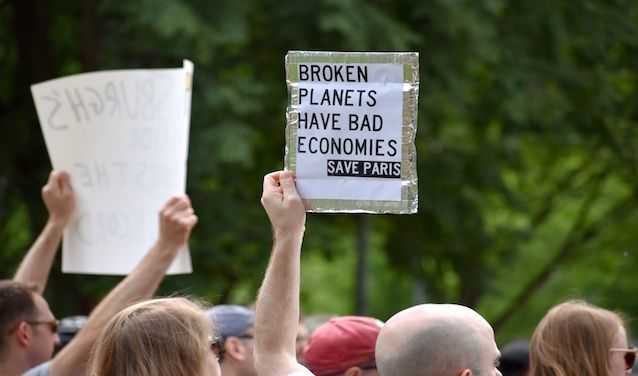Home>The Paris Agreement: what can we expect from the US?

16.06.2017
The Paris Agreement: what can we expect from the US?
On June 13th, the Institute for Sustainable Development and International Relations (IDDRI) welcomed Sue Biniaz, adjunct professor at Columbia Law School and the US State Department’s former lead climate attorney, to Sciences Po. Having played a key role in international climate negotiations, such as COP21 and the Paris Agreement, she delivered her analysis on what we can expect today from the US following the announcement to withdraw from the Paris Agreement.
Below are some of the highlights from Sue Biniaz’ presentation:
A Political & Ideological Decision
After many years of international tension regarding climate action, the Paris Agreement was considered a landmark, according to Sue Biniaz, that fixed the key issues that the US had with the Kyoto Protocol. This time, targets are neither negotiated nor legally binding, and all Parties, developed as well as developing, have common obligations.
The US government was faced with multiple options and eventually chose to withdraw from the Paris Agreement for reasons both political and ideological, stated Biniaz. President Trump sought to respect the pledge that he had made during his campaign to ‘cancel’ the agreement, which had been ‘negotiated by Obama,’ in a context of profound distrust for multilateral institutions.
Those in favor of remaining in the deal, on the other hand, argued that from an economic perspective, withdrawal was not wise. Biniaz noted the fact that many American businesses, including oil and gas companies, lobbied fiercely for the US to remain a part of the Agreement. Moreover, Biniaz noted the argument evoked by Secretary of State Tillerson, which asserted that protecting American interests abroad would be significantly harder without “a seat at the table.”
Withdrawing is Still an Open Question
The decision to withdraw was not reflective of a majority view, stated Biniaz, given that 60-70% of US public opinion was in favour of staying in the Paris Agreement. This is further demonstrated by the increased initiative and action that many states and cities in the US are taking in response to the President’s announcement. Despite the legal constraints, they are currently thinking of ways to reflect their commitment to the Paris Agreement. Biniaz noted, however, that it is unclear whether the increased fervor with which states and cities are approaching the issue of climate change, such as committing to maintain the targets under President Obama, will continue in the long-term.
In addition, Biniaz noted that during his announcement, President Trump left “a little bit of a door open” for the US to remain a part of the deal. With his references to ‘renegotiating’ and ‘re-entering,’ there is some uncertainty about future US participation. The term ‘renegotiation,’ for instance, suggests that the US could revise their emissions target. ‘Renegotiation’ in the sense that the US could amend the text of the Paris Agreement, on the other hand, is a “non starter,” stated Biniaz, citing the general perception of the deal as a “balanced package.”
Regarding negotiations in the years to come, Biniaz stated that the US should have a constructive role and actively participate, despite the announcement to withdraw. Should the US government choose to rejoin the Paris Agreement at a later time or take part in future agreements, having participated in the development of the rules and guidelines would provide more favorable opportunities to pursue its national interests.
By David Levaï and Delphine Donger (Institute for Sustainable Development and International Relations, IDDRI)
Related Links
- Watch the interview with Sue Biniaz, the US State Department’s former top climate lawyer (credits: @Iddri/Terre TV)
- The G20’s Time for Climate Leadership: Read Teresa Ribera’s analysis on how the world should respond to President Trump’s climate policies
- “This agreement does not solve things; it provides a framework.” Watch Sciences Po Professor Tubiana, one of the Financial Times Magazine Women of 2015, discuss the Paris Agreement
- Find out more about the Institute for Sustainable Development and International Relations, IDDRI